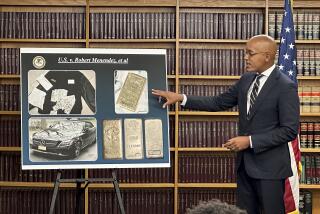Espionage Case Not Expected to Disrupt Close U.S.-Egypt Relations
- Share via
WASHINGTON — The United States is expected to continue its close cooperative relationship with Egypt despite criminal charges against two Egyptian army colonels and three American accomplices accused of trying to steal U.S. ballistic missile technology, an Administration official said Saturday.
“This certainly causes some tension and you are always surprised when something like this happens,” the official said. “But the (Washington-Cairo) relationship is built on a lot of things that have not changed.”
For more than a decade, Egypt has been Washington’s closest friend and most consistent supporter in the Arab world. The relationship was cemented with a $2.3-billion-a-year U.S. aid program, second only to Israel’s U.S. aid share, more than $3 billion annually.
Egypt, the only Arab nation to conclude a formal peace treaty with Israel, regularly supports American diplomacy in the Middle East. For instance, Egyptian President Hosni Mubarak is the only regional leader to endorse Secretary of State George P. Shultz’s apparently stalled Arab-Israeli peace initiative.
Refuse Comment
Egyptian officials both in Washington and Cairo refused to comment on the charges that were unsealed Friday in U.S. District Court in Sacramento.
According to the criminal complaint filed by U.S. Atty. David F. Levi, the five suspects conspired to ship to Egypt samples of a sophisticated carbon fiber used for ballistic missile nose cones, rocket nozzles and radar-evading stealth aircraft. Customs officials seized 430 pounds of the product Wednesday as it was being loaded on an Egyptian C-130 cargo plane at Baltimore-Washington airport.
U.S. officials theorized that Egypt planned to use the material for the nose cone of a medium-range missile, designated Condor 3, being developed by Egypt and Argentina.
The case comes at an especially sensitive time because the United States has been waging a largely unsuccessful campaign to check the spread of ballistic missiles throughout the volatile Middle East. Iran and Iraq both have used missiles in their Gulf War combat, Saudi Arabia has obtained Chinese-made missiles, Syria is considering the purchase of Chinese rockets and Israel has its own ballistic missile program.
Nevertheless, the United States has invested too much in its relationship with Cairo to permit even a serious espionage case to get in the way. Earlier, the Reagan Administration refused to permit the spying of Jonathan Jay Pollard to interrupt its alliance with Israel or to pull back from its relationship with Pakistan after a Pakistan-born Canadian businessman was accused of trying to smuggle nuclear weapons technology to Pakistan.
‘All Doing It’
“All of our friends seem to be doing it,” one Administration official said.
Congressional supporters of Israel have suggested that Washington should pull back somewhat from Egypt because of a chill that has overtaken Egypt-Israel relations in recent years. However, it is unlikely that Israel’s backers would attempt to use an espionage case to drive a wedge between the United States and Egypt because of the activities of Pollard, who is serving a life prison sentence after his admitted sale of U.S. military secrets to Israel over a period of 15 months prior to his arrest in November, 1985.
“If I were those people, I would just keep my mouth shut,” the Administration official said in reference to Israel’s friends.
The Justice Department said the Egyptian army officers were Mohammed Abdullah Mohammed, a colonel attached to the Egyptian Embassy in Washington, and Hussam Yusef, a colonel assigned to a diplomatic mission in Salzburg, Austria.
Mohammed was arrested but claimed diplomatic immunity. He is expected to be expelled from the United States.
Levi said he would try to extradite Yusef, described by prosecutors as the person in charge of the entire operation. However, the colonel enjoys diplomatic immunity in Austria which could prevent his extradition.
Others accused included Abdul Kader Helmy and his wife, Albia Eltayeb Helmy, and James Huffman. The Helmy couple live in the Sacramento suburb of El Dorado Hills. Helmy is employed by Aerojet Propulsion Co. in Sacramento. Huffman lives in Lexington, Ohio, and is a marketing representative for Teledyne Inc.’s McCormick Selph unit.
More to Read
Sign up for Essential California
The most important California stories and recommendations in your inbox every morning.
You may occasionally receive promotional content from the Los Angeles Times.













